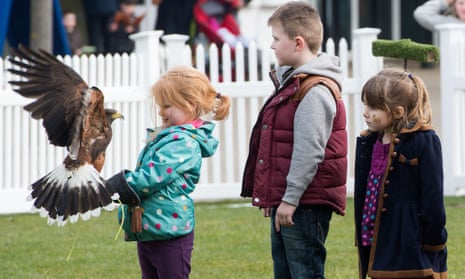A childhood brush with beekeeping, a foray into falconry or a fossil-hunting trip could inspire a new generation of much-needed engineers, scientists and mathematicians, new research suggests.
Schools are being urged to consider introducing children to a hobby related to science, technology, engineering and maths – the so-called Stem subjects – after a major study found that it could leave them with a lifelong interest and shape their career path.
The research also suggested that hobbies may even help increase the number of female scientists and those from ethnic minorities.
It comes as ministers desperately try to boost the number of workers with skills in Stem subjects – a key part of an industrial strategy published at the start of the year. Brexit is likely to intensify the need for Stem graduates as immigration rules are tightened.
The government has said it wants to make Britain the best place in the world to study maths, science and engineering. However, the UK has a shortage of technical-level skills and ranks 16th out of 20 developed countries for the proportion of people with technical qualifications, according to the Organisation for Economic Co-operation and Development.
But a spot of astronomy could play a role as well as investment, according to a study by academics at North Carolina State University, published in the International Journal of Science Education.
The research looked at a cohort of almost 3,000 adult hobbyists in the US who took part in 10 hobbies – astronomy, beekeeping, birdwatching, robotics, environmental monitoring, falconry, gardening, home brewing, model building and rock collecting.
It found that in several groups, more than half of the adult hobbyists reported first participating in their hobby during their youth. The study said the data “illustrates how crucial childhood experiences are to encouraging lifelong explorations in Stem”.
It highlighted an opportunity for schools, as the role of teachers was not reported as being the strongest influence in taking up the activities among any of the hobby groups. Family was rated as the greatest influence on hobbyists involved with gardening, rock and fossil collecting and beekeeping. Astronomy and robotics hobbyists rated “significant events” as having a high or very high level of influence on the start of their interest.
It also suggests that more involvement by teachers could boost a love of the hobbies among ethnic minorities. “This work found family and friends to be quite influential when sparking an initial interest in a hobby. In the case of minority youth, if their family and other members of their immediate social network are less likely to participate in a Stem hobby themselves, then that child is also less likely to be presented with the opportunity to participate and develop a Stem hobby.
“Children who don’t have these opportunities through their family and friend social network may be less likely to become Stem-interested adults, and may also be less likely to be interested in a future career in Stem.
“This presents a profound opportunity for … teachers and other non-family community members who spend time with youth to play a greater role in supporting youth interest development in free-choice Stem pursuits.
“Teachers should create opportunities for children to participate in these activities, perhaps connecting with hobbyists interested in outreach in their communities, to provide inclusive opportunities for their students. Only through intentional and targeted outreach will these free-choice spaces begin to be perceived as interesting and accessible to members of a broader community.”
Some schools are already working with beekeepers and falconry to give their pupils an insight that may change their life choices. Julia Pigott, a beekeeper who works with two school projects in Cumbria, said that she had seen the impression it made on some children.
“When I’m working with adult beekeepers, it’s amazing how many say they had bees at school,” she said. “Quite a few of the older generation will tell you that their interest arose through a teacher – in the old days, it was more common. I think times are changing again.
“It is like all practical things where you have a practical element – as soon as you can take the lid off something and take a look at the parts, you really get the children’s interest. There is a sub-group who are simply not interested, but there is a significant group that are.
“The measurements inside a beehive have to be very accurate, so they can get into maths. If you’re lucky enough to get any honey, you can get into selling, managing the accounts of beekeeping at schools. It goes into everything.”

Comments (…)
Sign in or create your Guardian account to join the discussion